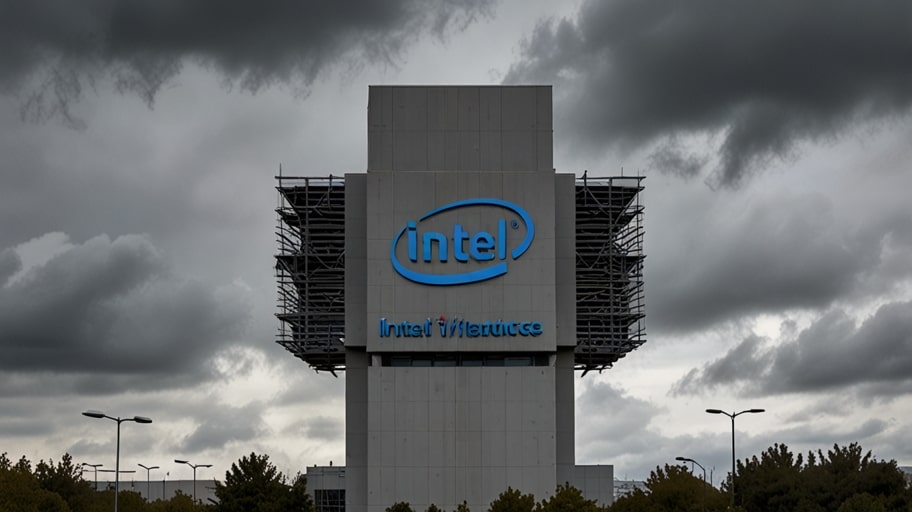Even though Intel was once a big name in the semiconductor business, its ambitious comeback is failing due to growing issues with chip production. The efforts to get ahead in the market are facing challenges because of supply chain issues and problems with manufacturing.
Already worried investors caused Intel’s stock to drop by 7% upon learning that it would push its next-generation chips back. There are new concerns after the news that Intel faces strong competition from companies like Nvidia and AMD in the developing world of AI and data centers.
The delays are due to issues with making 3nm chips at Intel’s factories. Because Intel has faced obstacles, the company’s clients who expect server and AI performance gains from its processors are becoming impatient.
After announcing plans to challenge TSMC, the company’s promise seems very unclear, which has made people doubt its strategic decision. While Intel says it will fix the problems, analysts think that when they will be fixed is still unknown, which is causing more doubts among investors.
These difficulties were noticed throughout the sector, so semiconductor stocks dropped to reflect Intel’s continuing struggles. Supply chains continue to suffer because of the scarcity of global chips and political difficulties in Asia. Volatility has appeared in every tech-heavy index as Intel’s problem led investors to anticipate a rocky time ahead. Because of these problems, the company’s turnaround depends on getting ahead again in technology.
Nvidia and AMD are focusing extra on marketing their chips for AI and gaming, taking advantage of the current situation. They have seized the chance given by Intel’s hold-up and landed contracts with key names in the cloud industry. There is a risk that Intel will fall further behind in the data center market since its leading position has slowly diminished. It is important for the company to move swiftly to stop clients from switching to other companies that offer better services.
Intel CEO Pat Gelsinger is leading a renewal at Intel, but he now faces heavy pressure. Intel’s founder has aimed to make the company a leading foundry, but so far, his plans have not made investors happy. Levels of debt have gone up due to Gelsinger dedicating more money to developing new production sites, which is worrying investors. Showing a clear path to financial success is now essential for earning back people’s trust in him.
The company’s financial situation is expected to be poor, as Intel warned that it will make less revenue than previously estimated. The longer the delays last, the higher the production costs may go, and the fewer sales there will be. People are worried that Intel cannot achieve its growth goals without encountering fierce industry competition. Due to these reasons, the company’s shares could drop even more.
The consumer part of Intel’s business is under duress in the current market. Not many are buying the company’s PC processors, since people are working less from home these days. If the company misses its deadlines for shipping new chips, it could cause even more consumer concerns, mainly among those who need fast and advanced solutions. The trust that used to go with the Intel brand is now at risk.
Due to the delays, people are holding the company’s board responsible, and they want answers. Efforts to watch T.J. Gelsinger’s strategy more closely are increasing since investors wonder if Intel can fulfill its promises in the foundry business. Intel’s ability to restore market confidence and set its stock price right will largely depend on what the board does.
Intel’s problems are of particular interest to the industry since they relate to challenges faced by others, too. Because of issues with supplies and rising prices, chipmakers are having a hard time working on new developments. Problems at Intel might make investors less interested in semiconductor stocks, although rivals’ achievements in AI and cloud technology may lead to new improvements.
Gelsinger is facing tough challenges that have never arisen for him before. How well he overcomes production problems and fulfills the company’s foundry contracts will decide where Intel goes from here. Being outdone could mean giving key positions to competitors, but a proper recovery could again position Intel at the forefront of tech progress.
Tracking Intel’s future business plans is important for global markets, and its stock leaves a big mark on mainly semiconductor indexes. Solving the delays quickly could support the industry, however, if the uncertainty goes on too long, it may have a negative impact on investors. The chip industry’s outlook will depend largely on Intel being able to get through this crisis.
Previously, Intel had to cope with dropping market share and technological flaws, but this new issue will show how resilient it is. Gaining a firm position requires the company to set long-term targets and meet them right away. The way Intel handles this situation will show people in the tech industry if the company can succeed once again.
